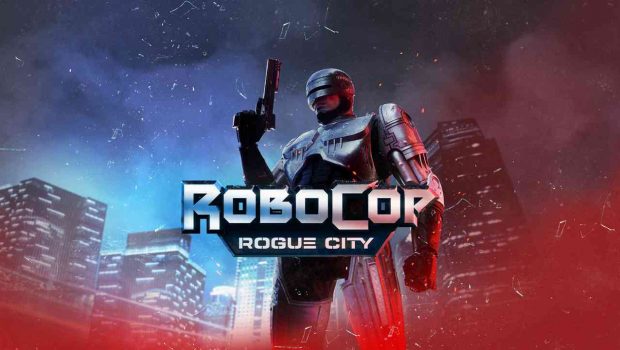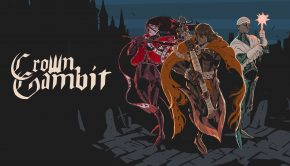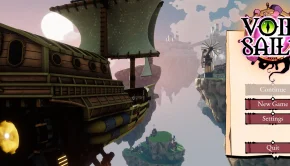Robocop: Rogue City PC Review – Cops and Robotics
Summary: An immersive first-person shooter and RPG hybrid experience faithful to the original films while standing on its own two (robotic) feet.
4.1
Cops and Robotics
Remember when video games based on films were abundant? Whether it was a beloved Hollywood franchise or the latest animated marvel, there was a time we were accustomed to being able to play the game version of our favourite film – with varying levels of quality.
Developer Teyon, the team behind Rambo: The Video Game and the excellent Terminator: Resistance, has quietly revived the feel of this bygone era in recent years with its focus on creating adaptations of 1980’s action flicks that feel faithful to the source material, while offering new and original storylines. RoboCop: Rogue City is its latest project, and it’s one that reignites the excitement and nostalgia associated with the series – while also being a great game in itself.
At its core, RoboCop has always been a tale of a mechanized man clinging to his humanity and fighting against corruption and crime to protect the innocent. Rogue City stays true to this theme, providing an authentic experience as the titular RoboCop and immersing players in a dystopian world of Old Detroit. Set between the events of RoboCop 2 and RoboCop 3, the game revolves around RoboCop’s battle against a new wave of crime led by notorious gangs the Torch Heads and Street Vultures financed by a man known only as “The New Guy”, as well assisting the Detroit Police Department and local citizens in solving various other crimes and societal issues.
The story of RoboCop: Rogue City isn’t dependent on having knowledge of the films to enjoy, but it’s certainly one that is made for fans first and foremost. Nuke, the street drug established in RoboCop 2, is still ravaging Old Detroit and being pushed by these new gangs, and several television and radio news segments reverently harken back to the first two films’ satirical take on consumerism and crime-infested urban metropolises. Of course, Alex Murphy/RoboCop, again voiced by Peter Weller, is back and outwardly stoic and hard on crime as ever, while still experiencing painful flashbacks of his former life as a human. Thankfully, returning characters, like partner Anne Lewis and Sergeant Warren Reed, and new allies like repentant addict turned informant Pickles and recruit Ulysses Washington, help RoboCop along the way.
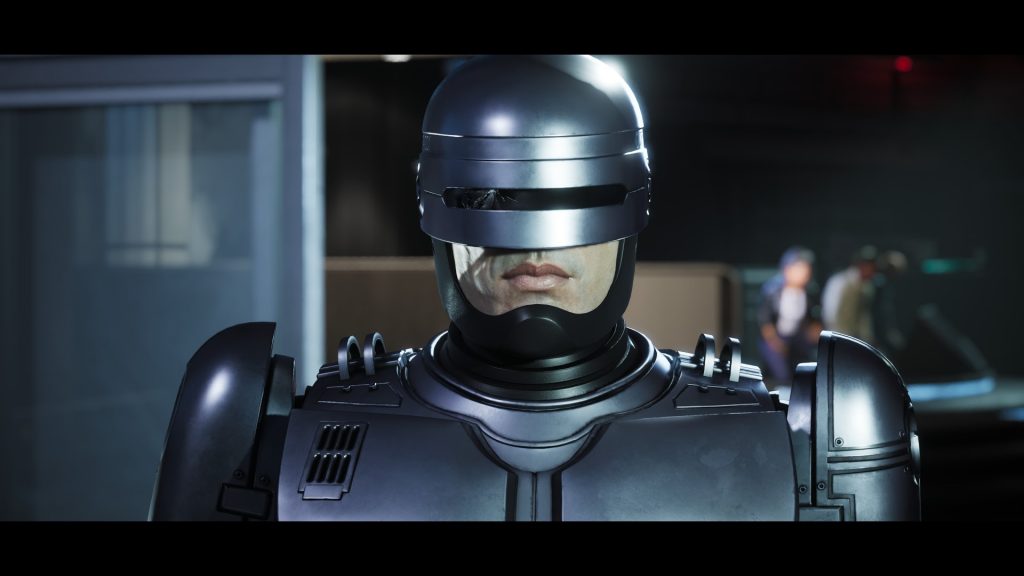
As a fan of the first movie, it’s hard not to get swept up in developer Teyon’s faithful reconstruction of Robocop’s dystopian setting. The city, its numerous contained zones and its cynical and selfish populace look and feel exactly like the movies’ exaggerated 1980’s urban setting, complete with CRT televisions, neon-lit arcades, grimy backstreets and green and black computer interfaces, probably the best adaptation since Teyon’s own Terminator: Resistance. Teyon does an equally good job in making Old Detroit feel alive, constructing interesting side-quests alongside the main story to provide plenty of genuine twists and turns, and interesting but basic choice-based decisions and dialogue options that affect gameplay and influence the ending, depending on if you serve the public trust or act as a hard-ass lawbringer.
In terms of gameplay, Rogue City is an intriguing hybrid of first-person shooter with role-playing elements. You control RoboCop from the first-person perspective while exploring Old Detroit and shooting down hostile criminals, of which there are many. RoboCop is equipped with his iconic Auto 9 Pistol by default and you can also acquire a number of different firearms from fallen foes, as well as fling objects and grab criminals to throw around like ragdolls or use as shields. The gunplay is extremely visceral and immersive, with every firefight heightened by hyper-stylised violence whenever you shoot a gangster’s hand or head off, and the cybernetic targeting system that activates whenever you aim down your sights helps evoke the feeling of RoboCop being a terrifying mass of marching metal, tanking through bullets, breaching through walls and clearing rooms with methodical ease. Compared to other high-budget first-person shooters, aiming and moving in RoboCop: Rogue City is a little clunky and less intuitive, but the sheer spectacle and power fantasy on offer is fantastically realised.
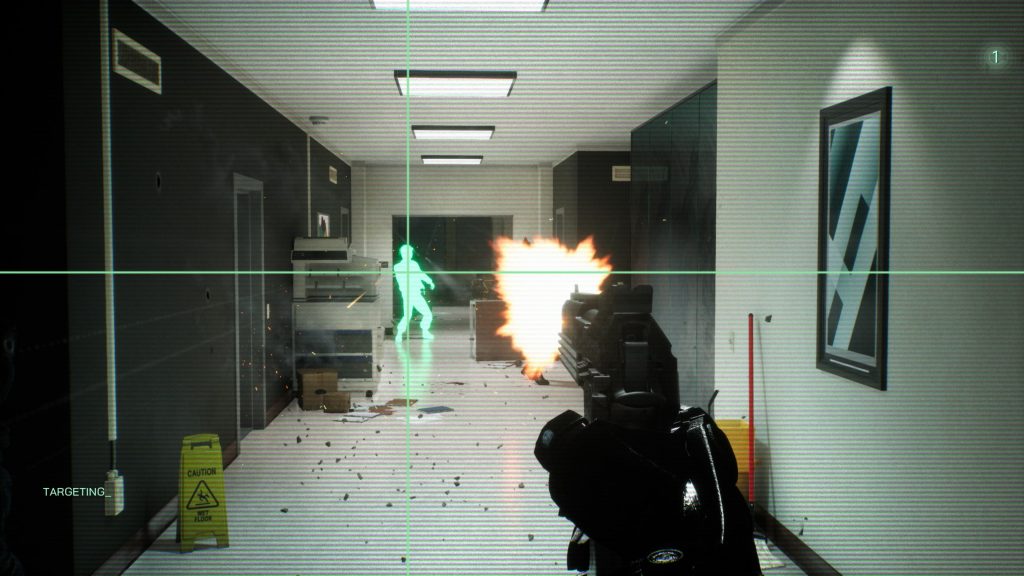
The enemy AI, while a bit basic for my taste, does present a challenge if you’re looking for it, given that RoboCop isn’t invincible; some later gangsters are equipped with heavier weapons such as turrets and grenades, and too much oncoming fire can present a genuine threat, especially on the highest difficulty setting. Your threat level is offset further by RocoCop’s sheer weight, which the game portrays well – every turn is sharp, every step a slow and weighty stomp, and sprinting is more of a power walk. Time and sheer numbers, then, are your biggest threats, as hostages can get killed in the cross-fire.
This is a RPG-lite too, though, and additional combat options and other passive bonuses are unlocked via a basic skill tree system (with eight branches), of which you spend the XP you gained by solving crimes, finishing quests, handing out tickets for infringements and confiscating contraband or stolen goods. There’s a shockwave ability that lets you stun nearby enemies for a short time, a dash skill that lets you ram into foes or escape a hail of bullets, and an upgrade that lets you stylishly ricochet bullets off scannable areas to hit enemies behind cover. They’re fun additions that help round out an otherwise straightforward combat system that doesn’t change dramatically from start to finish, but remains fun throughout as it replicates the film’s fantasy of RoboCop being an unstoppable force. There’s also useful non-combative skills to consider, including a deduction and psychology branch that helps RoboCop scan the environment more effectively and unlock dialogue options, respectively.
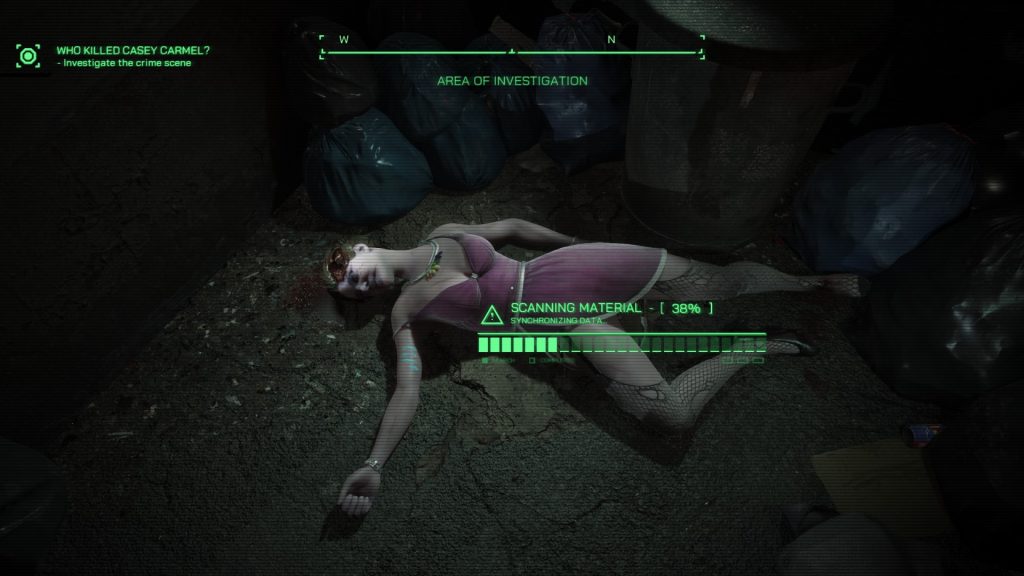
These latter abilities come in handy in the game’s quieter segments, which sees RoboCop patrol Old Detroit and explore its neighbourhoods and buildings in a semi-open world level structure, and it’s in these optional activities that RoboCop: Rogue City feels like more than just a linear series of shooting galleries. Several local citizens can be talked to, and it’s in these dialogue scenes that the perspective shifts to third-person, with several choices and dialogue options available that can either help or punish them depending on how you perceive your particular brand of RoboCop. There’s a teenage graffiti tagger that you can catch and either let off with a warning or punish with a hefty fine, several potential parking tickets to dole out, a murdered prostitute linked to a shifty actor, and a drug dealer ripping off his suppliers (with a hilarious segment that sees them all, including RoboCop, argue about economics) as some examples of the local crimes you can deal with in between the main plot, all of which you can handle aggressively or empathetically. There’s also a lot of environmental clues and secrets you can glean using RoboCop’s scanning capabilities to find relevant information or evidence, adding to the fantasy of being this state-of-the-art cybernetic beat cop out to dole out justice his way.
Robocop: Rogue City may not be a big-budget title, but it’s certainly a looker in the visual department. This is an Unreal Engine 5 game that makes use of Lumen lighting effects, and the results, at least on the PC version, are superb. I played at 1440p with a 60fps cap on a RTX 3060 TI and experienced little to no issues, with several graphics options on offer to tweak things as I went. There’s support for all up-scaling and supersampling options on launch (NVIDIA DLSS and DLAA, Intel XeSS and AMD FSR), and sliders for texture, quality, post-processing, motion blur, frame-rate and more that will satisfy most PC gamers wanting to get the most out of the game’s rendition of Detroit, which looks and feels uncannily like the original two Robocop films in both aesthetic and atmosphere, especially with Lumen lighting effects toggled on.
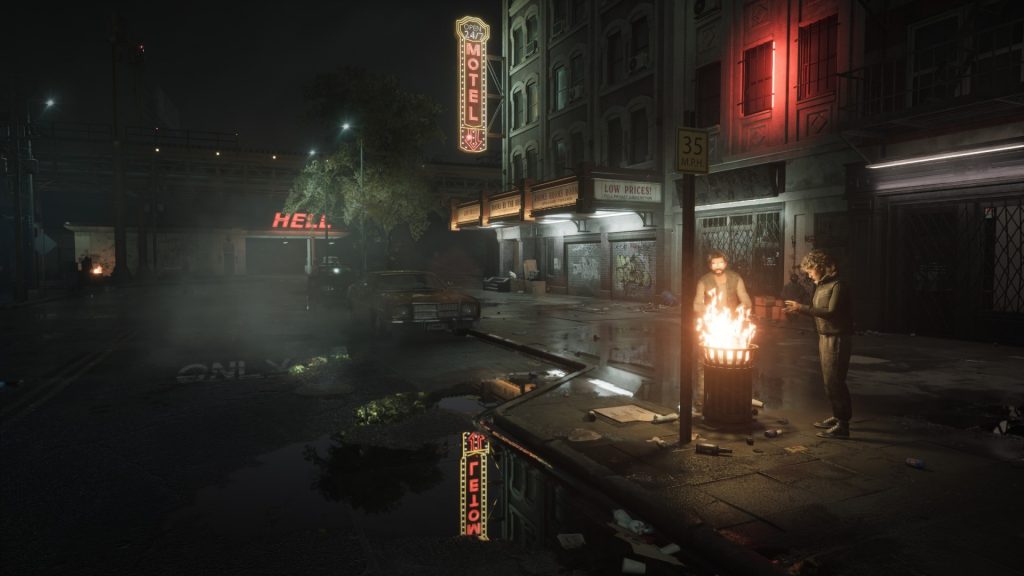
There’s no getting around the dated look of the character models, though, with lifeless eyes, robotic facial expressions and some issues in lip-syncing at times for non-critical characters – though RoboCop, Anne Lewis and the other big names are rendered in higher fidelity and look fantastic. Some of the self-contained zones, too, feel too much like corridor kill-zones, though the fidelity of every single grimy detail is enough to distract from the reality. As a fan of Teyon’s previous games however, Rogue City is a clear step-up in the presentation department overall, and the voice-acting quality does wonders to make each scene feel authentic to the film’s universe – Peter Weller’s return as RoboCop in particular is well realised, and he has a fair few new hilarious one-liner quips if you choose some of the more aggressive dialogue options.
The Final Verdict
Promising an authentic RoboCop experience, Rogue City sets high expectations from the start, and in my personal experience, it definitely delivers what’s expected with a little more on top for good measure. This is a fun and immersive first-person shooter with just enough interesting RPG elements to diversify the core gameplay loop, immerse yourself in the world of Old Detroit as RoboCop himself, and keep on your toes for some genuinely well written quests and twists.
Is it a game for non-fans? I would say no given a lot of the charm comes from the faithful and authenticity and recreation of the films, but for fans of the film or anyone craving a non-open world, story-based shooter, don’t overlook Rogue City this holiday period – it’s a decent game with some neat ideas that easily punches above its weight.
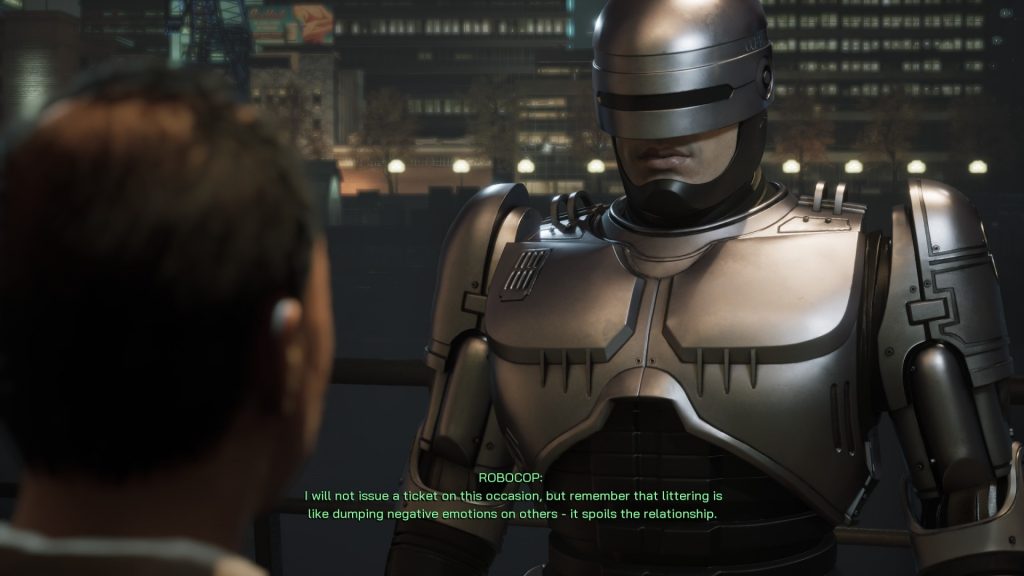
Game Details
Primary Format – Games – Microsoft Windows, PlayStation 5, Xbox Series X | S
Game Genre – Survival-horror
Rating – MA15+
Game Developer – Teyon
Game Publisher – Nacon


